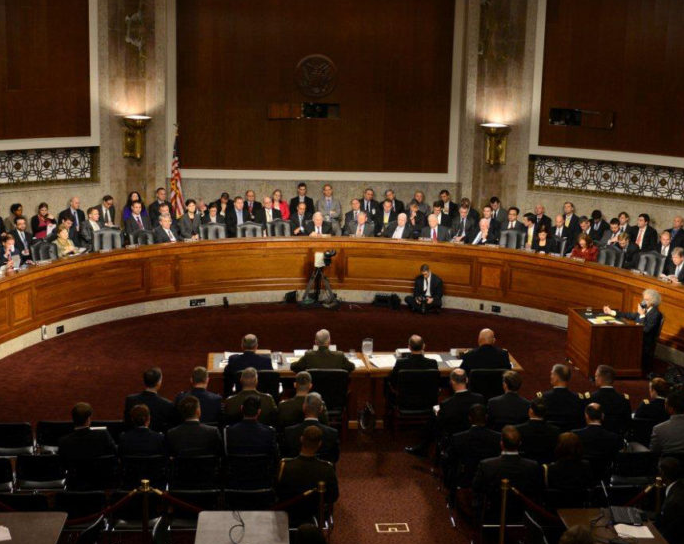A powerful House panel is trying to clip the wings of the executive branch on cannabis reform. This week, a U.S. House subcommittee quietly passed a provision that would stop the Department of Justice from using any of its funds to reclassify cannabis—even as the Biden administration pushes for a major policy shift on the issue.
Without any fanfare or debate, lawmakers approved language buried in a larger appropriations bill that could stall federal cannabis reform indefinitely.
A Quiet Vote with Big Implications
The House Appropriations Subcommittee on Commerce, Justice, Science (CJS) and Related Agencies voted 9–6 on July 15 to approve a 154-page spending bill. On the surface, it’s a routine budget measure, packed with funding for law enforcement, science, and space programs. But tucked deep inside is a single clause that could freeze federal cannabis reform in its tracks.
Just 33 words long, Section 607 reads like legal boilerplate:
“None of the funds appropriated or otherwise made available by this Act may be used to reschedule marijuana … or to remove marijuana from the schedules established under [the CSA].”
Short, but sharp. That sentence alone—if passed into law—would block any DOJ-led attempt to downgrade cannabis from Schedule I, its current classification alongside heroin and LSD.

What This Means for the DOJ and DEA
The bill doesn’t cut cannabis funding directly. But it does something more subtle—it pulls the rug from under the DOJ and DEA, denying them the legal and financial backing to act on cannabis reclassification.
Normally, the Attorney General has the final say on rescheduling drugs under the Controlled Substances Act (CSA). But since 1973, that power’s been handed off to the DEA.
Here’s the rub:
-
The DOJ would still get $37.3 billion under the bill.
-
The DEA’s budget would remain largely intact at $2.8 billion.
-
But neither agency could touch cannabis scheduling, even if the Biden administration wants to.
One paragraph in a 154-page bill just upended years of incremental reform.
A Broader Pattern of Congressional Resistance
This isn’t the first time Congress has flexed its muscles on cannabis scheduling. In fact, the legislative branch has repeatedly introduced its own rescheduling and decriminalisation bills—none of which have become law.
Some recent examples include:
| Bill Name | Sponsors | Goal | Outcome |
|---|---|---|---|
| MORE Act | Rep. Jerry Nadler (D-NY) | Remove cannabis from CSA entirely | Passed House twice, stalled in Senate |
| STATES 2.0 Act | Reps. Dave Joyce (R-OH), Max Miller (R-OH), Dina Titus (D-NV) | Remove cannabis from CSA, leave it to states | Still pending in committee |
This week’s CJS bill takes a different route. It doesn’t try to change cannabis law directly—it just prevents federal money from being used to enact any change.
No Debate, No Mention, Just a Vote
The subcommittee’s move caught many off guard—not because of what was said, but because of what wasn’t. There was no public debate. No press release. No discussion during the hour-long markup session.
The summary of the bill doesn’t even mention cannabis.
And yet, the provision passed. Quietly. Just like that.
You’d think something with this much impact would come with headlines or at least a spirited floor discussion. But instead, it was approved in near silence. Deliberately low-key, perhaps?
Reactions: Applause from Prohibitionists, Silence from Reformers
The response from cannabis advocates? Crickets—for now.
Meanwhile, Smart Approaches to Marijuana (SAM), a group that opposes cannabis reform, was quick to celebrate. They called the subcommittee vote a “major win for public health and safety.”
In a post on X (formerly Twitter), the group wrote:
“The House CJS Appropriations bill just passed with SAM-backed provisions blocking the federal rescheduling of marijuana and restoring DOJ power to go after medical marijuana dispensaries near schools, even in legal states.”
Whether that last part holds up legally remains murky. But SAM clearly sees the vote as a green light to push back harder.
What Happens Next?
The bill now heads to the full House Appropriations Committee. If it survives there, it’ll move on to the House floor—and from there, potentially the Senate.
That said, this is just one piece of a massive budget bill. And budget bills are often tweaked, amended, or stripped down before becoming law.
Still, the inclusion of anti-rescheduling language—even temporarily—signals real resistance within Congress to the Biden administration’s cannabis stance.
And it comes at a delicate moment: the Department of Health and Human Services has already recommended moving cannabis to Schedule III. The DEA has been reviewing that recommendation for months.
If this budget clause passes, it could grind that process to a halt.
A Tense Tug-of-War Between Branches
This move also raises constitutional questions. Congress clearly has the power of the purse—but should it use it to undercut an agency’s regulatory process?
Supporters of the clause say yes. They argue cannabis reform is too serious a matter to be left to agencies. Opponents say it’s an attempt to sidestep science and stall progress.
And with the 2024 election cycle heating up, cannabis—once seen as a bipartisan issue—is being pulled into a new kind of culture war.
As of now, the Biden administration’s proposed rescheduling plan remains up in the air. But thanks to 33 quiet words in a 154-page bill, that plan may never see the light of day.
